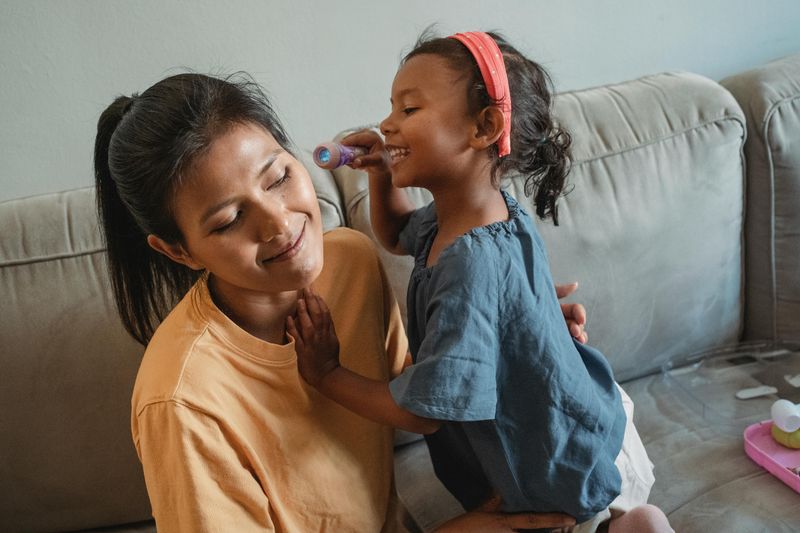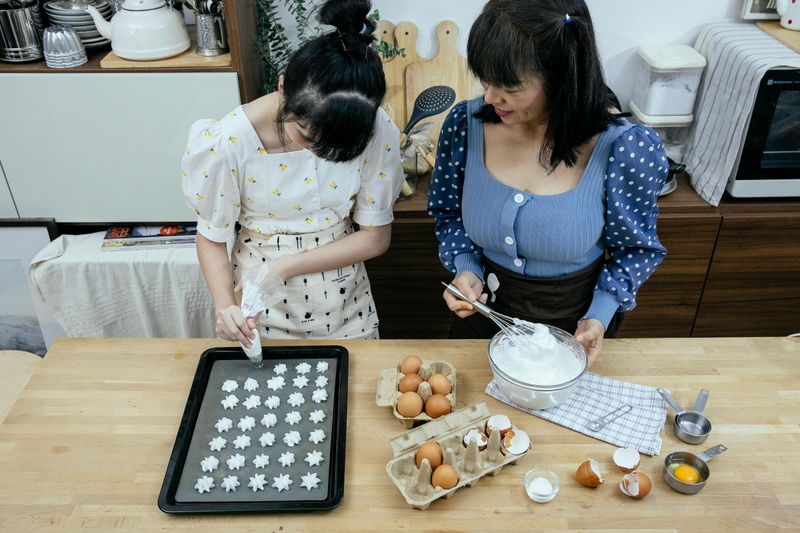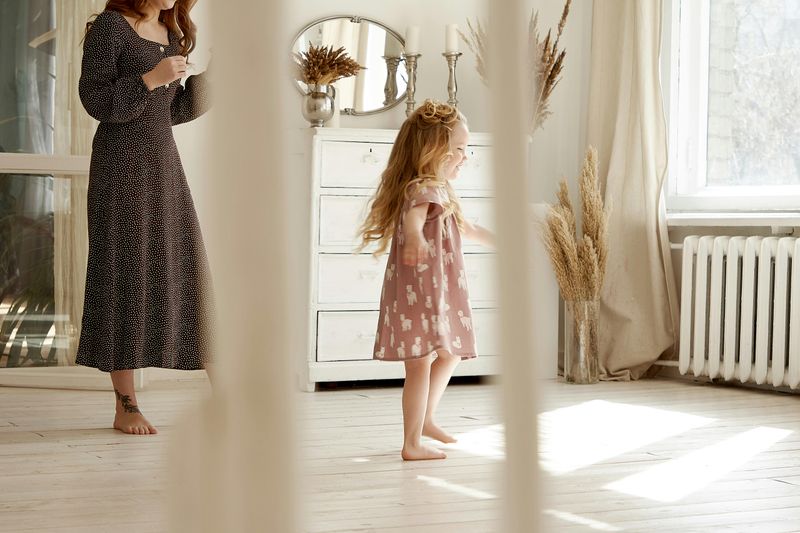33 Hidden Struggles Only Eldest Daughters Will Understand
Being the eldest daughter in a family often comes with its unique set of challenges, a phenomenon commonly referred to as ‘eldest daughter syndrome.’ In many cultures, the eldest daughter is expected to shoulder additional responsibilities, which can shape her identity and life experiences in profound ways.
This blog post delves into the emotional, mental, and physical struggles faced by these women, highlighting the weight of family expectations, the default caretaker role, and the constant pressure to be a role model.
Through these challenges, we aim to shed light on the resilience and strength that eldest daughters display, while also encouraging a journey towards self-care and breaking free from limiting stereotypes.
We’ll explore 30 specific struggles, divided into sections such as family dynamics, personal identity struggles, societal expectations, and the impact on relationships, each crafted to resonate with anyone who has walked this path.
1. Expectativas familiares
It’s a common scenario where the eldest daughter is perceived as the second-in-command after the parents. Expectations come from every corner, demanding her to be the family’s anchor. She often feels the need to uphold family traditions, make critical decisions, and sometimes even mediate family disputes. This role is thrust upon her, not chosen, and it can be overwhelming.
Balancing these expectations with personal goals can be daunting. She may find herself prioritizing family needs over her own aspirations, leading to a sense of lost identity. While it’s rewarding to be a pillar of strength, the pressure can be immense.
The invisible contract of responsibility weighs heavily, often leading to stress and anxiety. It’s important for her to carve out time for herself, to step back and assess her own needs without guilt. Recognizing that she doesn’t have to carry the family’s burdens alone is a crucial step towards maintaining her well-being.
2. Cuidador por defecto
Being the immediate fallback for caregiving duties is a reality many eldest daughters face. From a young age, they’re expected to watch over their siblings, sometimes even more than the parents themselves. It’s an unspoken agreement that sees her stepping into a parental role, often at the expense of her own childhood.
The responsibility of ensuring her siblings’ well-being can be both a source of pride and pressure. This role requires immense maturity and patience, qualities that are developed prematurely. The boundaries between sister and caretaker blur, complicating familial relationships.
Despite the challenges, this experience hones her nurturing abilities, often shaping her into a compassionate individual. However, it’s crucial to remember that she deserves moments of respite and that it’s okay to seek help. Emphasizing self-care and setting boundaries can alleviate some of the pressures associated with being the default caretaker.
3. Presión del modelo
Eldest daughters often find themselves under the microscope, as they’re expected to set a good example for their younger siblings. This pressure to be perfect can be daunting, as any misstep feels magnified and closely scrutinized by both family and society.
La necesidad de sobresalir en los estudios, mantener un comportamiento ejemplar y encarnar los valores familiares puede conducir a una lucha constante contra el perfeccionismo. Esta búsqueda de la perfección puede ser mentalmente agotadora y provocar agotamiento. Equilibrar los deseos personales con estas expectativas se convierte en caminar por la cuerda floja.
Yet, being a role model also fosters leadership skills and resilience. It’s important for eldest daughters to recognize their achievements and allow themselves grace in moments of imperfection. Embracing their individuality and setting realistic standards can help mitigate the pressure of being a role model. Encouraging open conversations about these feelings with family can also provide relief and support.
4. Identidad perdida
In the process of fulfilling familial roles and expectations, eldest daughters often grapple with a sense of lost identity. They’re frequently defined by their responsibilities, which can overshadow their personal interests and dreams. This struggle to carve out a distinct identity beyond family obligations is a silent battle.
La presión para ajustarse a las expectativas familiares y sociales puede ahogar el autodescubrimiento. Las hijas mayores pueden reprimir sus pasiones por miedo a que entren en conflicto con sus deberes. Este conflicto interno puede provocar sentimientos de insatisfacción y falta de realización.
However, this struggle also presents an opportunity for growth and self-exploration. Taking small steps towards self-expression and pursuing interests outside of family roles can gradually help reclaim one’s identity. Allowing themselves the freedom to explore and evolve, eldest daughters can redefine their sense of self, independent of familial expectations. Encouragement from loved ones can further empower them on this journey.
5. Mediador en conflictos
Eldest daughters often find themselves as the unofficial mediators in family conflicts. Whether it’s resolving misunderstandings between siblings or easing tensions between parents, they are frequently called upon to maintain peace. This role demands emotional intelligence and diplomacy, requiring her to be the calming influence in turbulent situations.
Aunque esto puede mejorar sus habilidades para resolver conflictos, también la coloca en una posición en la que absorbe gran parte de la tensión emocional. Ser el intermediario en los conflictos puede ser agotador y afectar a su salud mental.
It’s essential for her to recognize her limits and not feel obligated to solve every problem. Seeking external support, such as counseling, can provide strategies to manage these situations without becoming overwhelmed. Remembering that she’s allowed to take a step back and not be the family mediator at all times is crucial for her well-being.
6. Equilibrio entre tradición y modernidad
Navegar por la delgada línea entre la adhesión a las tradiciones familiares y la adopción de estilos de vida modernos es una lucha común para las hijas mayores. A menudo son las portadoras de las costumbres culturales, de las que se espera que mantengan las tradiciones al tiempo que se integran en la sociedad contemporánea.
Este acto de equilibrio puede ser un reto, ya que puede sentirse dividida entre complacer a su familia y seguir su propio camino individual. El miedo a decepcionar a los miembros de la familia o a ser malinterpretada aumenta la complejidad de esta lucha.
Sin embargo, este reto también ofrece la oportunidad de combinar lo mejor de ambos mundos, creando una identidad personal única. Hablar abiertamente de sus perspectivas y aspiraciones con la familia puede ayudar a comprender mejor sus decisiones. Al aceptar la flexibilidad y el compromiso, las hijas mayores pueden honrar su herencia y al mismo tiempo abrazar su individualidad, creando una mezcla armoniosa de tradición y modernidad.
7. Prioridades profesionales y familiares
Compaginar las aspiraciones profesionales con las obligaciones familiares es un dilema común para las hijas mayores. Suelen sentir el tirón de las responsabilidades familiares mientras se esfuerzan por construir una carrera de éxito. La expectativa de estar presentes en acontecimientos familiares y emergencias puede entrar en conflicto con los compromisos profesionales.
Este acto de equilibrio requiere una cuidadosa priorización y gestión del tiempo, habilidades que las hijas mayores suelen dominar por necesidad. Sin embargo, la necesidad constante de conciliar trabajo y familia puede generar estrés y sentimientos de incapacidad.
Embracing open communication with both family and employers can help manage expectations and create a supportive environment. It’s important for her to set clear boundaries and delegate responsibilities when possible. Recognizing that it’s okay to prioritize her career at times and that doing so doesn’t diminish her dedication to her family is key to achieving a more balanced life.
8. Sacrificar el tiempo personal
Eldest daughters often sacrifice their personal time for the sake of family responsibilities. Whether it’s attending to siblings’ needs, helping with household chores, or being there for family events, their personal time gets constantly encroached upon.
Esta abnegación, aunque admirable, puede llevar al agotamiento y a la falta de realización personal. Las constantes demandas de su tiempo pueden dejarles pocas oportunidades para dedicarse a sus aficiones o simplemente relajarse.
It’s crucial for eldest daughters to prioritize self-care and carve out time for themselves. Even small moments of solitude or engaging in a favorite activity can rejuvenate their spirit. Setting boundaries and communicating her need for personal time to family members can also help ensure that she has the space to recharge and nurture her own well-being, ultimately benefiting both herself and her family.
9. Presión para tener éxito académico
The pressure to excel academically is a common challenge faced by eldest daughters. They’re often expected to set an academic standard for their younger siblings, which can lead to immense pressure to perform well in school.
Esta expectativa puede llevarles a trabajar sin descanso, sacrificando a menudo las actividades sociales y la relajación para satisfacer estas exigencias académicas. El estrés de sacar buenas notas puede afectar a su salud mental y provocar ansiedad y agotamiento.
It’s important for eldest daughters to recognize that their worth isn’t solely measured by academic achievements. Finding a healthy balance between studies, extracurricular activities, and downtime can alleviate some of this pressure. Encouraging family members to celebrate efforts and personal growth rather than just results can create a more supportive environment, allowing her to thrive academically without compromising her well-being.
10. Carga emocional
Eldest daughters frequently bear the emotional burden of their families. They’re often seen as the go-to person for support and advice, tasked with listening and providing comfort to family members in distress.
While being a source of emotional support is valuable, it can be overwhelming for her to absorb the worries and anxieties of others. This role can lead to feelings of isolation, as she might suppress her own emotions to maintain a strong façade for the family.
It’s essential for eldest daughters to seek outlets where they can express their own emotions and receive support. Whether it’s talking to friends, engaging in creative activities, or seeking professional counseling, finding a safe space to share their feelings is crucial. Recognizing that it’s okay to set boundaries and prioritize their emotional health can help them manage this burden more effectively, fostering a healthier family dynamic in the process.
11. Sentirse infravalorado
A pesar de sus importantes contribuciones, las hijas mayores a menudo se sienten infravaloradas dentro de sus familias. Sus esfuerzos en la gestión de las responsabilidades domésticas, el cuidado de los hermanos y el apoyo emocional pueden pasar fácilmente desapercibidos, lo que les lleva a sentirse menospreciadas.
La falta de reconocimiento puede ser desalentadora y hacer que cuestionen su valía e importancia dentro de la estructura familiar. Esto puede provocar resentimiento y una sensación de invisibilidad.
To counteract these feelings, it’s important for them to communicate their need for appreciation and recognition. Encouraging an open dialogue with family members about these emotions can foster a more supportive and appreciative environment. Additionally, practicing self-affirmation and acknowledging their own efforts can help bolster their sense of value and self-worth, reminding them that their contributions are indeed significant.
12. 12. Responsabilidades financieras
Taking on financial responsibilities at a young age is a reality for many eldest daughters. Whether it’s contributing to household expenses or supporting younger siblings’ education, they often find themselves managing finances alongside their personal goals.
Este doble papel puede resultar abrumador, ya que equilibrar las obligaciones financieras con las aspiraciones personales requiere una cuidadosa elaboración de presupuestos y toma de decisiones. La presión por garantizar la estabilidad financiera de la familia puede provocar estrés y ansiedad.
It’s important for eldest daughters to seek advice and support in managing these responsibilities. Exploring financial planning resources and discussing budgeting strategies with trusted individuals can provide guidance. Recognizing that it’s okay to prioritize their own financial goals and seek assistance when needed can help in striking a balance between family obligations and personal financial growth, ensuring a more secure and fulfilling future.
13. Vida social limitada
Las hijas mayores suelen tener una vida social limitada debido a las responsabilidades familiares. Equilibrar las tareas de cuidado y las tareas domésticas puede dejar poco espacio para socializar o entablar amistades.
Esta restricción puede provocar sentimientos de aislamiento y soledad, ya que pueden perderse experiencias y conexiones cruciales para el desarrollo personal. El constante malabarismo de funciones puede dificultar el mantenimiento de un círculo social dinámico.
To address this, it’s important for eldest daughters to prioritize social interactions and carve out time for friendships. Finding creative ways to integrate social activities into their routine, such as virtual hangouts or shared hobbies, can help maintain connections. Communicating their need for social engagement to family members can also create opportunities for them to enjoy a balanced life, fostering both personal growth and family harmony.
14. Expectativas culturales
Eldest daughters often bear the weight of cultural expectations, tasked with upholding traditions and customs that define their family’s identity. They’re expected to embody cultural values and pass them on to younger generations, a role that can feel both honorable and burdensome.
Enfrentarse a estas expectativas puede ser todo un reto, sobre todo cuando entran en conflicto con las creencias personales o los valores modernos. La presión por mantener la continuidad cultural al tiempo que se persiguen las aspiraciones individuales puede crear una lucha interna.
Sin embargo, este papel también brinda la oportunidad de celebrar y preservar el patrimonio cultural de forma significativa. Entablar conversaciones abiertas con la familia sobre cómo adaptar las tradiciones a los estilos de vida contemporáneos puede fomentar la comprensión y la flexibilidad. Abrazar la diversidad dentro de su identidad cultural puede permitir a las hijas mayores honrar sus raíces al tiempo que exploran nuevos aspectos de sí mismas, creando un sentido equilibrado y enriquecido de sí mismas.
15. Altos estándares
A menudo, las hijas mayores se exigen mucho a sí mismas, impulsadas por el deseo de cumplir las expectativas familiares y servir de modelo. Esta búsqueda de la excelencia puede ser a la vez motivadora y pesada, ya que exige un esfuerzo y una dedicación constantes.
Aunque esforzarse por alcanzar el éxito es encomiable, la presión por cumplir siempre estos elevados estándares puede provocar estrés y autocrítica. El miedo a quedarse corto puede obstaculizar el crecimiento personal y crear un ciclo perpetuo de esfuerzo sin satisfacción.
It’s important for eldest daughters to practice self-compassion and recognize that perfection isn’t the only measure of success. Setting realistic goals and celebrating small achievements can help alleviate the pressure of maintaining high standards. By embracing a more balanced approach, they can find fulfillment in their efforts and cultivate a healthier relationship with their aspirations, allowing for personal growth and contentment.
16. Rivalidad entre hermanos
Las hijas mayores se encuentran a menudo en medio de rivalidades entre hermanos, con la tarea de mantener la armonía y resolver conflictos. Este papel requiere paciencia y diplomacia, ya que navegan por la compleja dinámica entre hermanos.
Aunque la gestión de estas relaciones puede reforzar su capacidad para resolver conflictos, también puede ser una fuente de frustración y tensión. La presión para garantizar la unidad de los hermanos puede eclipsar a veces sus propias necesidades y preferencias.
To manage this, it’s important for eldest daughters to set boundaries and encourage open communication among siblings. Allowing themselves to step back from this role when needed can prevent burnout and maintain healthy relationships. Encouraging siblings to work through their conflicts independently can foster mutual respect and understanding, creating a more balanced family dynamic and allowing her to focus on her own well-being.
17. Expectativas en las relaciones
Eldest daughters often carry the weight of familial expectations into their personal relationships. They’re expected to maintain the same level of responsibility and care that they exhibit within their family, leading to high expectations from partners.
Esto puede suponer una presión para desempeñar múltiples papeles, manteniendo el equilibrio entre ser un compañero que apoya y gestionar sus propias necesidades. El miedo a decepcionar a la familia o a la pareja puede aumentar el estrés de mantener una relación sana.
It’s important for eldest daughters to communicate openly with their partners about these expectations and find a balance that respects their individuality. Encouraging mutual understanding and compromise can help create a supportive partnership. By prioritizing their needs and fostering healthy communication, they can enjoy fulfilling relationships that honor both their family values and personal aspirations.
18. Gestión de las expectativas familiares después del matrimonio
After marriage, eldest daughters often continue to feel the weight of family expectations, as they navigate the responsibilities of their new household while maintaining ties with their family of origin. This dual role can be challenging, as they’re expected to balance the needs and expectations of two families.
La presión por mantener la armonía y cumplir las obligaciones en ambos frentes puede provocar estrés y fatiga. El miedo a defraudar a cualquiera de las dos familias puede complicar aún más este acto de equilibrio.
To manage these expectations, it’s important for eldest daughters to establish clear boundaries and communicate openly with both families about their needs and limitations. Prioritizing self-care and seeking support from their partner can help alleviate the burden. Embracing flexibility and compromise can create a harmonious balance between their dual roles, ensuring a fulfilling post-marriage experience that honors relationships on both sides.
19. Presión para casarse
The pressure to marry is a common experience for eldest daughters, as families often project their hopes and expectations onto their marital status. This can lead to feelings of anxiety and stress, as they’re expected to meet societal milestones.
Navigating this pressure requires resilience, as they’re tasked with honoring family expectations while pursuing their own timeline and desires. The fear of disappointing family can create internal conflict and affect personal relationships.
To manage this, it’s important for eldest daughters to communicate openly with their family about their perspectives on marriage and life goals. Encouraging understanding and patience can help alleviate some of the pressure. By prioritizing their own happiness and making decisions aligned with their values, they can create a fulfilling life path that respects both family traditions and personal aspirations.
20. Ser un pilar de fortaleza
Eldest daughters are often seen as the pillar of strength within their families, expected to maintain composure and support others through difficult times. This role requires resilience and fortitude, as they navigate the challenges of being a reliable source of stability.
Aunque ser un pilar de fortaleza es admirable, también puede ser emocionalmente agotador. La presión de mantenerse fuerte por los demás puede provocar sentimientos de aislamiento, ya que pueden sentirse incapaces de expresar su vulnerabilidad o buscar apoyo.
It’s crucial for eldest daughters to recognize the importance of self-care and seek outlets where they can express their emotions. Finding supportive networks, whether friends, partners, or counselors, can provide a safe space to share their burdens. Encouraging an environment where mutual support is valued can help alleviate some of the pressure, allowing them to maintain their strength while also nurturing their own well-being.
21. Sacrificar los sueños personales
Eldest daughters often face the challenge of sacrificing personal dreams to accommodate familial obligations. Whether it’s delaying career goals or putting personal aspirations on hold, they frequently prioritize family needs over their own desires.
Este desinterés puede ser gratificante, pero también provoca sentimientos de arrepentimiento e insatisfacción. El equilibrio constante entre las responsabilidades familiares y las ambiciones personales puede crear conflictos internos y obstaculizar el crecimiento personal.
However, it’s important for eldest daughters to recognize the value of pursuing their dreams and finding a balance that respects both family and personal aspirations. Seeking support from family members to share responsibilities and embracing opportunities for personal growth can help them achieve their goals. By nurturing their own dreams, they can inspire their family and create a fulfilling life path that honors their unique ambitions.
22. Miedo al fracaso
The fear of failure is a common struggle for eldest daughters, as they’re often expected to excel in various aspects of life. This pressure to succeed can lead to anxiety and self-doubt, as the fear of not meeting expectations looms large.
Este miedo puede obstaculizar el crecimiento personal, ya que puede llevarles a evitar asumir riesgos o buscar nuevas oportunidades. La necesidad constante de demostrar su valía puede convertirse en un obstáculo para explorar todo su potencial.
It’s important for eldest daughters to embrace a growth mindset and view failures as learning opportunities rather than setbacks. Encouraging self-compassion and celebrating efforts rather than just outcomes can foster resilience and self-confidence. By redefining their relationship with failure, they can overcome this fear and unlock their true potential, creating a life that is both fulfilling and enriching.
23. Equilibrar las emociones
Balancing emotions amidst family pressures is a continuous challenge for eldest daughters. They’re often expected to maintain a calm demeanor and manage their emotions while supporting others, leading to an internal struggle between personal feelings and familial expectations.
Este acto de equilibrio emocional puede ser agotador, ya que navegan por las complejidades de la dinámica familiar y el crecimiento personal. La presión para reprimir sus sentimientos puede conducir a una acumulación de estrés y fatiga emocional.
To achieve emotional balance, it’s important for eldest daughters to prioritize self-care and emotional expression. Practicing mindfulness and seeking supportive outlets for sharing their emotions can provide relief and clarity. Encouraging open communication with family members about their emotional needs can create a more understanding environment, fostering a healthy balance between familial expectations and personal well-being.
24. Gestión de secretos familiares
Eldest daughters are often entrusted with family secrets, tasked with maintaining discretion and protecting family reputations. This responsibility can be both an honor and a burden, as they’re expected to navigate the delicate balance between loyalty and transparency.
Managing family secrets requires discretion and emotional intelligence, as they weigh the implications of sharing or withholding information. This role can lead to feelings of isolation, as they’re unable to discuss these matters openly.
To manage this burden, it’s important for eldest daughters to seek guidance and support from trusted individuals outside the family. Encouraging an environment of openness and honesty within the family can alleviate some of the pressure. By fostering a culture of trust and understanding, they can navigate family secrets with integrity, ensuring a respectful balance between family loyalty and personal well-being.
25. Se espera que sea responsable
A menudo se espera que las hijas mayores sean responsables desde una edad temprana, asumiendo funciones y deberes que suelen reservarse a los adultos. Esta expectativa fomenta la madurez y la capacidad de liderazgo, pero también puede generar sentimientos de presión y carga.
Ser responsable implica gestionar tareas, cuidar de los hermanos y tomar decisiones, lo que a veces puede resultar abrumador. El miedo a cometer errores o a defraudar a los demás puede aumentar el estrés de esta función.
To manage these expectations, it’s important for eldest daughters to recognize their strengths and set realistic goals. Encouraging family support and sharing responsibilities can alleviate some of the pressure. By embracing their capabilities and seeking balance, they can fulfill their roles with confidence and resilience, creating a positive impact on their family dynamic while also nurturing their own growth.
26. Retos de la multitarea
La multitarea es una habilidad que las hijas mayores suelen desarrollar por necesidad, ya que compaginan las responsabilidades familiares, los objetivos personales y los compromisos sociales. Aunque esta habilidad es valiosa, también puede resultar abrumadora y conducir al agotamiento.
La necesidad de alternar constantemente entre tareas puede dificultar la concentración y la productividad, creando un ciclo de estrés y fatiga. Equilibrar varias funciones requiere una organización y una gestión del tiempo cuidadosas, habilidades que se perfeccionan con el tiempo.
To manage multitasking challenges, it’s important for eldest daughters to prioritize tasks and set realistic expectations. Encouraging a supportive environment where they can delegate responsibilities can alleviate some of the pressure. By practicing mindfulness and focusing on one task at a time when possible, they can enhance their productivity and well-being, creating a more balanced and fulfilling life experience.
27. Invasión del espacio personal
Las hijas mayores se enfrentan a menudo al reto de ver invadido su espacio personal, ya que los miembros de la familia acuden con frecuencia a ellas en busca de apoyo y orientación. Esta presencia constante puede dificultar el establecimiento de límites y el disfrute de la soledad.
The invasion of personal space can lead to feelings of frustration and fatigue, as they’re unable to find time for themselves to recharge. This lack of privacy can hinder personal growth and self-reflection.
To address this, it’s important for eldest daughters to communicate their need for personal space to family members. Setting clear boundaries and creating designated spaces for solitude can help protect their well-being. By prioritizing self-care and respecting their own needs, they can maintain a healthy balance between family responsibilities and personal space, ensuring a more fulfilling and harmonious life.
28. Desafíos de la brecha generacional
Navigating generational gaps within the family is a common struggle for eldest daughters. They’re tasked with bridging the divide between traditional family values and contemporary beliefs, a role that requires empathy and adaptability.
Este reto puede crear tensiones, ya que chocan perspectivas y expectativas diferentes. La presión de mediar entre generaciones manteniendo su propia identidad puede ser abrumadora.
To manage generational gap challenges, it’s important for eldest daughters to foster open dialogues with family members. Encouraging understanding and respect for diverse viewpoints can create a more harmonious family dynamic. By embracing flexibility and compromise, they can bridge the gap between generations, preserving family values while also embracing modern values, ensuring a balanced and enriched family experience.
29. El historiador familiar no oficial
As the eldest daughter, you might find yourself stepping into the role of the unofficial family historian. It’s not just about remembering birthdays and anniversaries, but also about cherishing those quirky family tales.
You’re the one who keeps track of who said what during that memorable family dinner two years ago. These stories become your responsibility, a tapestry of memories woven together, sometimes with missing threads.
While it can be overwhelming, it’s also an opportunity to connect deeply with your roots. Embrace being the storyteller; it’s a role that brings both joy and nostalgia.
30. El juez secreto de la moda
¿Alguna vez has criticado el vestuario de tu familia? Como hija mayor, puede que te conviertas sutilmente en la jueza secreta de la moda. Tus hermanos e incluso tus padres te piden consejo sobre moda, a veces sin darse cuenta.
There’s a silent trust in your sense of style, whether it’s picking out the perfect dress for your sister’s graduation or subtly suggesting a tie for dad’s important meeting.
Being the behind-the-scenes fashion consultant can be both fun and challenging. It’s a delightful way to express creativity while influencing the family’s fashion narrative in unexpected ways.
31. The Unseen Mentor
Eldest daughters often find themselves in the role of an unseen mentor. With parents busy with their responsibilities, the eldest daughter steps in, guiding her siblings through life’s intricate maze.
She offers advice on issues ranging from school projects to personal dilemmas, often without receiving formal recognition for her efforts.
While this role can be fulfilling, it often goes unnoticed, leaving the eldest daughter feeling like an unsung hero in her own family story.
32. The Unseen Therapist
Eldest daughters often take on the role of the family’s unofficial therapist — the go-to listener for everyone’s problems and the source of advice, all while juggling their own struggles.
This role can be emotionally draining, leaving little room for their own emotional needs to be addressed. Despite the exhaustion, they continue to offer a shoulder to cry on, understanding the unspoken rule that their family relies on them.
The challenge is finding balance and ensuring they don’t neglect their own mental health while being there for others.
33. The Unofficial Family Tech Guru
In many families, the eldest daughter becomes the go-to tech expert. From fixing Wi-Fi issues to explaining smartphone features, she’s the unofficial family tech guru.
This role comes with its own set of challenges. The expectation to solve every technical problem can be overwhelming. Often, the eldest daughter learns to troubleshoot through experience and necessity.
Despite lacking formal training, her intuitive understanding of technology becomes an unsung hero in the household. While it’s rewarding to help, this role sometimes hinders personal time and activities. But, the satisfaction of helping family often outweighs these struggles.








































